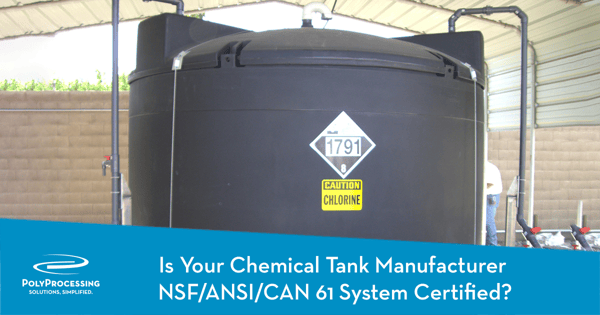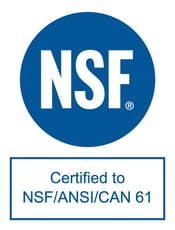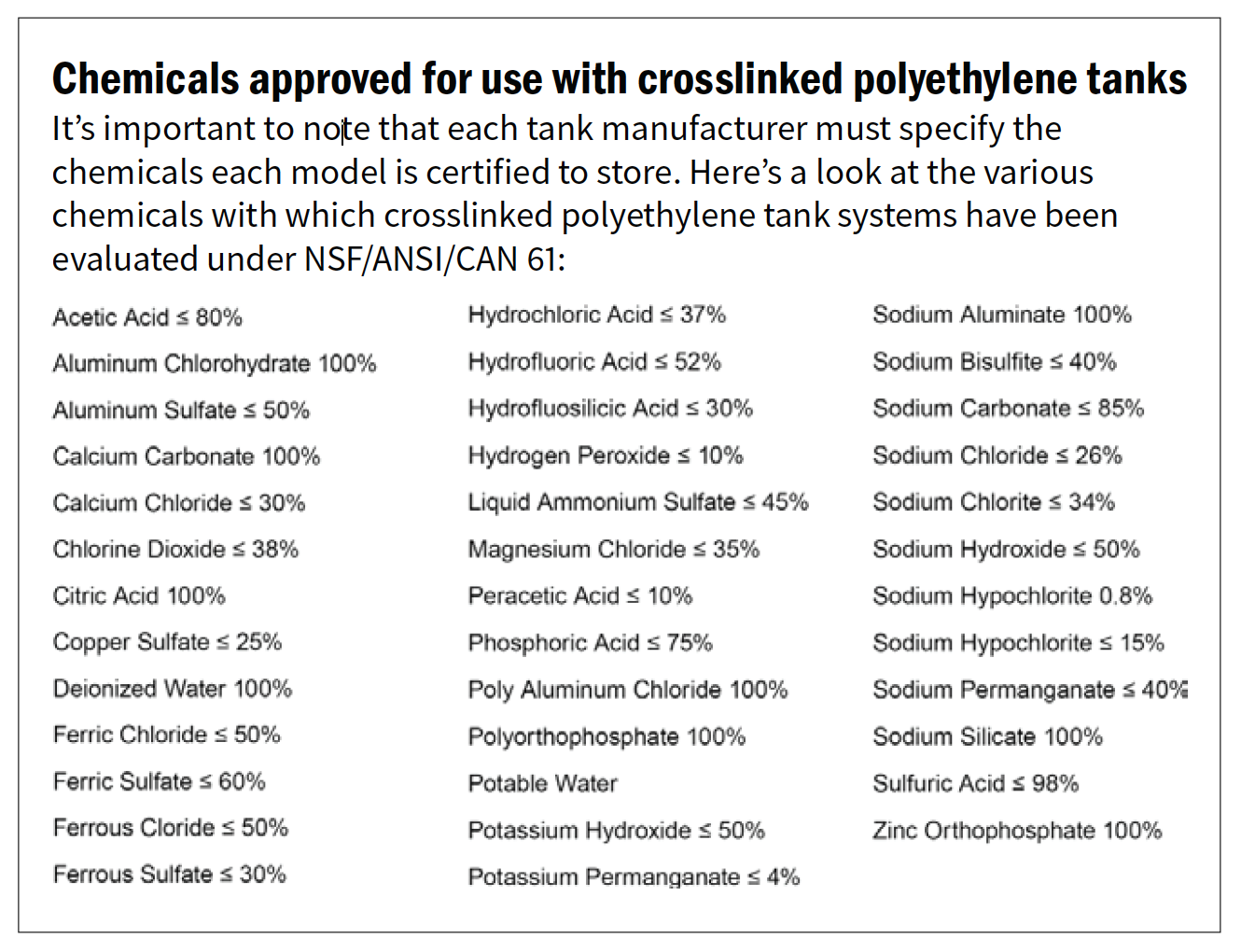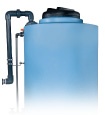[Featured] ESE Magazine: Is Your Chemical Tank Manufacturer NSF/ANSI/CAN 61 System Certified?
Are you familiar with the latest updates to the NSF/ANSI 61 standards? We cover everything you need to know in our article featured in the June 2019 edition of Environmental Science & Engineering Magazine.
The NSF/ANSI 60 standard for drinking water treatment chemicals and the NSF/ANSI 61 standard for drinking water system components have been updated for the Canadian market and published as National Standards of Canada. The standards initially published in 1988 have been renamed NSF/ANSI/CAN 60: 2018 Drinking Water Treatment Chemicals – Health Effects and NSF/ANSI/CAN 61: 2018 Drinking Water System Components – Health Effects.
Each component of a public water treatment system is subjected to meeting certain criteria. The most important standard may be NSF/ANSI/CAN 61 certification. However, there's confusion among customers as to what it is and what it covers.
Keep reading for the full article or download the pdf here.
NSF/ANSI/CAN 61
 NSF/ANSI/CAN 61 is a set of nationally-recognized standards. Developed by the American National Standards Institute (ANSI) and the National Sanitation Foundation (NSF), this standard refers to water treatment requirements. Potable water equipment or products that support its production fall under this standard's jurisdiction.
NSF/ANSI/CAN 61 is a set of nationally-recognized standards. Developed by the American National Standards Institute (ANSI) and the National Sanitation Foundation (NSF), this standard refers to water treatment requirements. Potable water equipment or products that support its production fall under this standard's jurisdiction.
Everything from ambient temperature water at various pH levels to more dangerous chemicals can be tested. In all cases the liquid is tested before and after exposure to a given piece of equipment to determine whether anything has been leached out or extracted from the equipment.
How To Tell If Your Chemical System Meets NSF/ANSI/CAN 61
There are various levels of certification that a system can achieve. This is because NSF-61 certification can apply to so many different concentrations of chemicals. This variance can make understanding a specific certification challenging.
This means some manufacturers incorrectly explain certification levels for their products. Some customers may end up buying the wrong product for their application. In fact, some products listed as NSF-61 certified may only apply to potable water and not chemical storage or vice versa.
Many manufacturers are testing pH 5, pH 8, and pH 10 exposure waters at ambient temperature, which is for potable water storage only. What they fail to account for is potential leaching of materials in chemical storage tanks. We recommend visiting the NSF website to ensure a product meets the standards based on the chemical application and that the certification is for the specific chemical, not for potable water storage.
Users can verify components listed by manufacturer along with the certified chemical components, as well as with the name of the chemical and percentage concentration. A less-than symbol means that a tank is certified to store up to that level of concentration.
A full system certification includes even small parts. Smaller parts like gaskets and fittings must also pass certification to consider the full system certified. It's important that all materials meet this standard for potable water and chemical storage.
Manufacturers That Offer a Smart Solution
When choosing a chemical storage tank manufacturer, it is important to make sure they can offer you a complete chemical storage tank system that is NSF/ANSI/CAN 61 certified. Currently, there is one company, Poly Processing Company, that manufactures poly tanks that have NSF 61 system certification for 35 of the most popular water treatment chemicals on their XLPE tank systems. Additionally, their certifications cover XLPE tanks with OR-1000 (an engineered antioxidant barrier) system.
Tanks Are Tested and Certified For Potable Water
Some manufacturers will imply that their poly tank systems are NSF certified for both chemicals and potable water. If those tanks aren’t tested and listed for potable water storage as well as chemical storage, then that is not the case. In order to certify tanks for potable water, the manufacturer sends vertical storage tanks to NSF for testing. During this testing, the tanks are filled with pH 5, 8, and 10 exposure waters that are formulated to simulate a variety of potable water conditions
These tests evaluate whether potentially harmful levels of chemical compounds from the tank itself are leaching into the water that is being stored. NSF uses pH 5 and pH 10 exposure waters to test for metals extraction and pH 8 exposure water for testing organics.

Tanks Are Tested and Certified For Chemical Storage
In addition to the potable water testing, tanks can be tested and certified under NSF/ANSI/CAN 61 for chemical storage end use. For these tests, NSF exposes the tanks to chemicals certified to NSF/ANSI/CAN 60.
The tanks undergo an exposure period dictated by the NSF/ANSI 61. Once the exposure time is completed, the chemical that was exposed to the tank material is analyzed for the presence of chemical compounds that may have leached from the tank itself. If there are no detectable leachants or the leachants are below pass-fail criteria, then the tank passes the test.
This testing is performed on the most aggressive chemicals that would be stored in the tank. Testing to the “worst-case scenario” in this way gives NSF the ability to predict the performance of other chemicals when exposed to the tank.
It is critical to work with a company with a complete chemical storage tank system certified to NSF/ANSI Standard 61. All chemical storage tanks and associated fittings must adhere to these stringent standards for the system to be NSF 61 certified.
The NSF/ANSI/CAN 61 standard does not test the overall strength of the material being used in the storage tank application.
Explore the magazine for yourself today. read the June 2019 issue of Environment Science & Engineering.
Have questions about NSF/ANSI/CAN 61? Ask one of our chemical storage experts.
- June 19, 2019
- Topics: Certifications and Standards
About Poly Processing
Posts By Topic
Tech Talk Podcast Episodes
Subscribe By Email
Recent Posts
- Why Cycling Causes Tank Failure: Tips for Prolonging Tank Life
- Small Changes in Tank Selection for Big Long-Term Cost Benefits
- NSF Certification vs. FDA Compliance: Understanding Chemical Tank Standards
- Why Chemical Storage Tank Wall Thickness Matters and How to Get It Right
- The Best of 2025 - Top 5 Chemical Storage Blogs
Tank Configurator

Find the recommended tank and system components for your chemical storage challenge.
Configure a Tank Package



